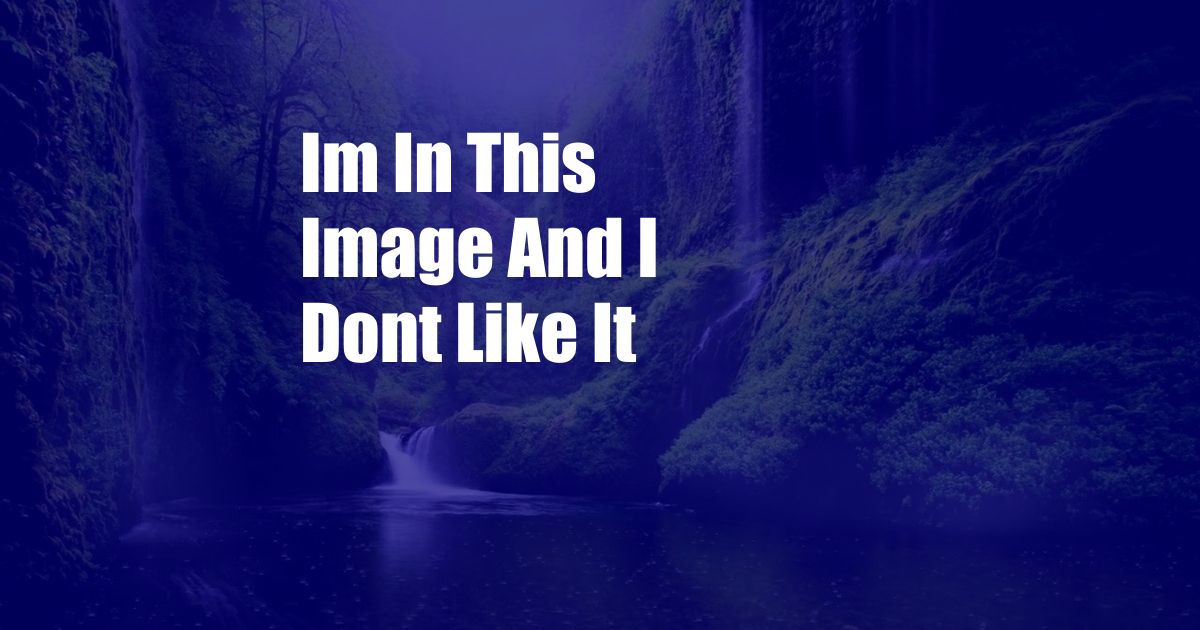
I’m in This Image and I Don’t Like It: Understanding and Addressing Image Privacy Concerns
In an era of ubiquitous digital photography and social media sharing, it’s increasingly common to encounter images of ourselves in online spaces without our consent. This can be a disconcerting experience, raising concerns about privacy, reputation, and the potential for misuse or harm. This article delves into the complex topic of image privacy, exploring its definitions, implications, and effective strategies for addressing these concerns.
The proliferation of digital cameras, coupled with the rise of social media platforms like Facebook, Instagram, and TikTok, has made it easier than ever to capture and share images with a global audience. While this has undoubtedly enriched our ability to connect and document our lives, it has also created a new set of privacy challenges. In many cases, images are shared without the knowledge or consent of the individuals depicted, potentially leading to privacy violations, defamation, and even harassment.
The Importance of Image Privacy
Image privacy encompasses the right of individuals to control the use of their images and protect their reputation and dignity. Unauthorized use of images can infringe upon a person’s privacy rights and may constitute defamation if the image is used in a false or misleading manner. Additionally, images can be used for surveillance or tracking purposes, potentially threatening personal safety.
The importance of image privacy is further underscored by the fact that once an image is shared online, it becomes virtually impossible to fully control its distribution or use. Search engines like Google and image recognition technologies make it easy for images to be indexed, shared, and repurposed by third parties. This can have far-reaching consequences, as images can be used for commercial gain, political manipulation, or even identity theft.
Understanding Image Copyright Laws
In many jurisdictions, copyright laws provide individuals with certain rights to control the use of their images. Copyright protection typically extends to original creative works, including photographs. This means that the photographer who takes an image generally holds the copyright to that image and has the exclusive right to reproduce, distribute, or publicly display the image.
However, copyright laws do not provide absolute protection. There are several exceptions to copyright protection, including fair use, which allows individuals to use copyrighted works for certain purposes, such as criticism, commentary, news reporting, or education. Additionally, in some cases, individuals may have a right to publicity, which protects them from the unauthorized commercial use of their name or likeness.
Strategies for Addressing Image Privacy Concerns
There are several strategies that individuals can employ to address image privacy concerns. These include:
- Be mindful of image sharing practices: Before sharing an image online, consider who might have access to it and how it might be used. Obtain consent from individuals depicted in the image and be respectful of their privacy.
- Use privacy settings: Most social media platforms offer privacy settings that allow users to control who can view and share their images. Use these settings to limit the visibility of images and prevent unauthorized use.
- Use image recognition tools: Image recognition tools can help individuals identify and track unauthorized use of their images online. These tools can be used to report copyright violations and request the removal of unauthorized images.
- Contact the image host: If you discover an image of yourself online that you believe was shared without your consent, contact the website or platform hosting the image and request its removal. Most platforms have policies in place to address image privacy concerns.
- Consider legal action: In some cases, it may be necessary to pursue legal action to protect your image privacy rights. This may involve filing a copyright infringement lawsuit or seeking an injunction to prevent the unauthorized use of your image.
Expert Advice for Protecting Image Privacy
In addition to the strategies outlined above, experts recommend the following tips for protecting image privacy:
- Educate yourself: Learn about image privacy laws and best practices to protect yourself from unauthorized image use.
- Be proactive: Monitor your online presence and take steps to remove or report unauthorized images of yourself.
- Collaborate with others: Join forces with organizations and individuals who advocate for image privacy protection.
- Stay informed: Keep up with the latest developments in image privacy laws and technologies.
FAQs on Image Privacy
Q: What is the definition of image privacy?
A: Image privacy refers to the right of individuals to control the use of their images and protect their reputation and dignity.
Q: What are the potential risks of unauthorized image sharing?
A: Unauthorized image sharing can lead to privacy violations, defamation, harassment, surveillance, and identity theft.
Q: What laws protect image privacy?
A: Copyright laws and right of publicity laws provide individuals with certain rights to control the use of their images.
Q: What steps can I take to address image privacy concerns?
A: Individuals can be mindful of image sharing practices, use privacy settings, use image recognition tools, contact the image host, or consider legal action.
Q: What can I do to protect my image privacy online?
A: Educate yourself, be proactive, collaborate with others, stay informed, and use privacy-enhancing technologies.
Conclusion
Image privacy is a critical issue in today’s digital world. The unauthorized use of images can have serious consequences for individuals’ privacy, reputation, and safety. By understanding the importance of image privacy and employing effective strategies to address these concerns, individuals can take control of their online presence and protect their personal information.
Are you interested in learning more about image privacy and how you can protect yourself from unauthorized image use? Share your thoughts and questions in the comments section below.